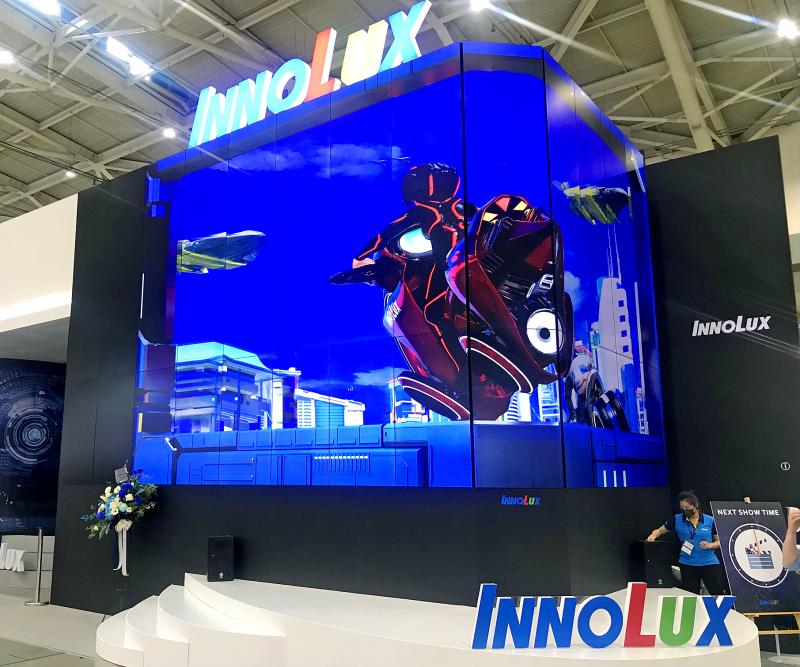Flat-panel maker Innolux Corp (群創) yesterday reported that net profit plunged about 83 percent last quarter to the lowest level in about one-and-a-half years, as the Russia-Ukraine war, China’s COVID-19 restrictions and surging inflation added to already-sluggish panel demand during the off season.
The lockdowns in China’s major manufacturing cities and transportation gridlocks drove up raw material costs, with Innolux’s operating expense ratio climbing to 9.1 percent, from 8.9 percent in the previous quarter and 8 percent in the first quarter of last year, company data showed.
Net profit last quarter plummeted to NT$1.89 billion (US$63.6 million) from NT$11.57 billion a year earlier. On a quarterly basis, net profit contracted 68 percent from NT$5.94 billion.

Photo: Chen Mei-ying, Taipei Times
Earnings per share dropped to NT$0.18 from NT$1.15 a year earlier and NT$0.56 in the prior quarter.
Gross margin fell to 12.3 percent from 25.8 percent in the same period last year and 15.2 percent in the previous quarter.
Innolux said it expects shipments of large flat panels to increase by a high-single-digit percentage this quarter from last quarter, benefiting from stabilizing supply chains, as well as restocking demand ahead of the high season in the second half of the year.
Average selling prices for large panels for TVs and PCs are forecast to slide by a low-teens percentage this quarter from last quarter’s US$372 per square meter, while shipments of small and medium-sized panels for vehicles and other applications are expected to grow by a high-teens percentage, the company said.
Innolux’s board of directors yesterday approved a proposal to cut the company’s paid-in capital by 9.5 percent to NT$95.56 billion and return NT$0.95 per share to shareholders.
The capital reduction plan aims to improve return on equity for shareholders, it said in a statement.
The board also proposed a cash dividend of NT$1.05 per share. That would represent a payout ratio of 19 percent based on the company’s earnings per share of NT$5.53 last year.
Innolux also plans to buy back 50 million shares to reward employees, it said.

PATENTS: MediaTek Inc said it would not comment on ongoing legal cases, but does not expect the legal action by Huawei to affect its business operations Smartphone integrated chips designer MediaTek Inc (聯發科) on Friday said that a lawsuit filed by Chinese smartphone brand Huawei Technologies Co (華為) over alleged patent infringements would have little impact on its operations. In an announcement posted on the Taiwan Stock Exchange, MediaTek said that it would not comment on an ongoing legal case. However, the company said that Huawei’s legal action would have little impact on its operations. MediaTek’s statement came after China-based PRIP Research said on Thursday that Huawei filed a lawsuit with a Chinese district court claiming that MediaTek infringed on its patents. The infringement mentioned in the lawsuit likely involved

Taipei is today suspending work, classes and its US$2.4 trillion stock market as Typhoon Gaemi approaches Taiwan with strong winds and heavy rain. The nation is not conducting securities, currency or fixed income trading, statements from its stock and currency exchanges said. Authorities had yesterday issued a warning that the storm could affect people on land and canceled some ship crossings and domestic flights. Taiwan Semiconductor Manufacturing Co (TSMC, 台積電) expects its local chipmaking fabs to maintain normal production, the company said in an e-mailed statement. The main chipmaker for Apple Inc and Nvidia Corp said it has activated routine typhoon alert

GROWTH: TSMC increased its projected revenue growth for this year to more than 25 percent, citing stronger-than-expected demand for AI devices and smartphones The Taiwan Institute of Economic Research (TIER, 台灣經濟研究院) yesterday raised its forecast for Taiwan’s GDP growth this year from 3.29 percent to 3.85 percent, as exports and private investment recovered faster than it predicted three months ago. The Taipei-based think tank also expects that Taiwan would see a 8.19 percent increase in exports this year, better than the 7.55 percent it projected in April, as US technology giants spent more money on artificial intelligence (AI) infrastructure and development. “There will be more AI servers going forward, but it remains to be seen if the momentum would extend to personal computers, smartphones and

Catastrophic computer outages caused by a software update from one company have once again exposed the dangers of global technological dependence on a handful of players, experts said on Friday. A flawed update sent out by the little-known security firm CrowdStrike Holdings Inc brought airlines, TV stations and myriad other aspects of daily life to a standstill. The outages affected companies or individuals that use CrowdStrike on the Microsoft Inc’s Windows platform. When they applied the update, the incompatible software crashed computers into a frozen state known as the “blue screen of death.” “Today CrowdStrike has become a household name, but not in